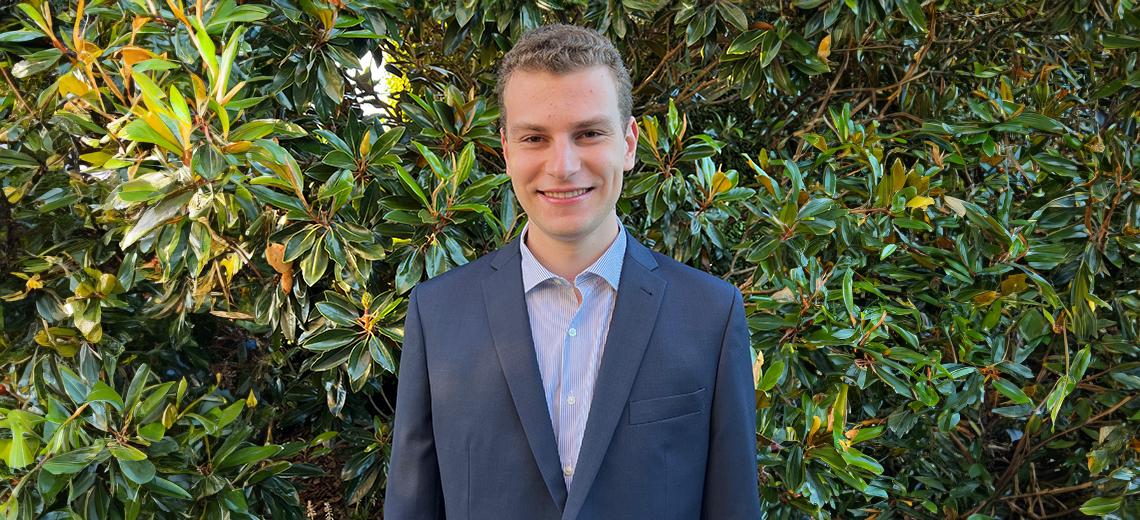
Matthew is graduating from The Australian National University (ANU) College of Business and Economics (CBE) with a double degree: Bachelor of Accounting and Bachelor of Finance (Capital Markets Major).
For Matthew, studying at CBE was the obvious choice.
“As a Canberra-born local, it made sense to study at a world-class university which is right on my doorstep,” he explains.
“After attending numerous ANU Open Days, I was very impressed with the flexibility offered by the University regarding study paths and the variety of opportunities available to CBE students to develop their employability.”
Matthew undertook many of these employability opportunities during his studies, including the Special Industry Project, CBE Internships, Momentum, and the ANU Student Managed Fund (SMF). These initiatives provide students with industry exposure, access to professional mentors, and workshops designed to build soft and technical skills.
In this interview, Matthew gives a comprehensive account of his enriching university experience, and shares vital information for future students to consider.
Q. Why did you choose to do a double degree in Finance and Accounting?
Since a young age, I’ve been interested in business and finance, but I enrolled in the Bachelor of Accounting and Bachelor of Finance (Capital Markets) double degree for numerous reasons.
- There is a fair amount of overlap between the two degrees. They are complementary, in that Accounting covers a broad range of fundamental topics relevant to all businesses and investments (e.g., debits and credits, taxation, commercial law and costing). Finance provides frameworks for thinking about how to invest and allocate capital to grow its value through time, and through various financial instruments, including shares in companies.
- The degree combination provided seven electives, allowing space to undertake for-credit CBE employability opportunities including the Special Industry Project, CBE Internships and SMF.
- Both degrees provide me with the requisite knowledge to complete further professional study should I choose to go down these paths e.g., the Chartered Accountants ANZ and Certified Practising Accountant and Chartered Financial Analyst designations.
Q. What was your favourite course and who was your favourite lecturer?
There are many courses I have enjoyed and lecturers who I have enjoyed learning from! If I were to pick one, it would be BUSN3014 – Principles of Tax Law with Dr Sonali Walpola. Sonali is passionate about her research in the areas of Commercial Law and Tax Law, and this flows through to her teaching. She is also the academic supervisor of the ANU Tax Clinic, where accounting students help unrepresented taxpayers understand their tax obligations with guidance from experienced tax practitioners.
I also found tax to be an interesting area to learn given its topical nature both at an individual and household, and corporate level. It’s a puzzle of how to use a set of ‘rules’ (tax legislation, case law and ATO rulings) to arrive at a ‘reasonable’ taxation figure for an entity. These set of rules are extensive, and different financial decisions create a range of tax implications.
Q. You completed the SMF course during your studies. How has your work with SMF enhanced your study experience?
Being part of the SMF Active Australian Equities team over the past year has been a fantastic experience. The level of ongoing teamwork and engagement through completing a variety of research and analysis tasks alongside other students is unparalleled. With the various sub-team, team and Investment Advisory Committee meetings that take place throughout the semester, I believe my presentation skills have greatly improved, as well as my ability to develop succinct investment cases and how to think like an investor. This was attributable to the comprehensive and ongoing feedback provided by Dr Anna von Reibnitz and Associate Professor Geoff Warren in my first semester in the fund, and by Dr Dean Katselas and Dr Hua Deng in the second. The course structure was quite unique given there are no exams and assignments, but rather the continuous completion of tasks throughout the semester. Investing is part art and part science, and the SMF is a great platform for testing investment thesis ideas, being creative and gaining insights and perspectives from others.
Q. What advice would you give to future students about how to make the most of their university experience?
- Do your best to learn about the opportunities provided by CBE to develop your employability. These opportunities do require prerequisites to be met (and free elective space), so try your best to structure your degree study path to allow you to take advantage of them.
- Do not worry if you are not 100 per cent sure of the degree you have selected, degree transfers are quite common. However, to ensure a degree transition is smooth, you should continuously reflect on your study and career goals and adjust plans as soon as possible where required.
- Continuously monitor for ANU and other career-related opportunities through the CBE Careers and Student Employability Facebook group, ANU Careerhub, student societies and any other platforms.
- Balance is key to preventing burnout – balance coursework, gaining professional working experience, supporting your wellbeing, along with networking and socialising.
- Enrol in for-credit courses such as MGMT2100 (Communication for Business) or CBEA2000 (Employability Fundamentals for Professional Practice) early in your study, if possible. In these courses you learn about the skills required of graduates entering the job market, and assessment includes creating a cover letter and CV.
Q. What are your plans after graduation?
Relaxation and travel from now until late January. Following this I will start a new full-time job as a Graduate Investment Analyst at Infradebt, a Canberra-based private debt fund manager who provide project finance for infrastructure with a focus on renewables and grid-scale batteries. I am very appreciative of this opportunity and am looking forward to beginning full-time work!
The ANU College of Business and Economics offers an extensive range of specialised programs. Click here for more details.
